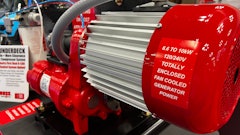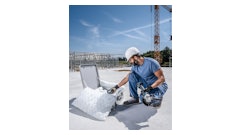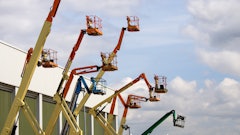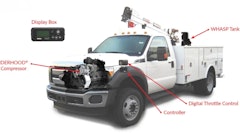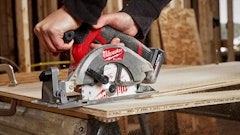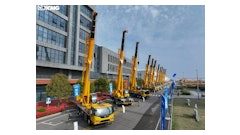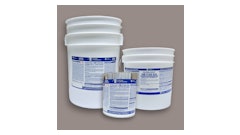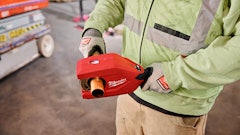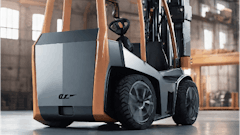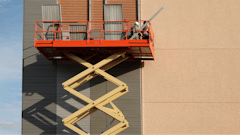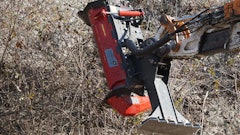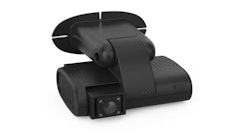
Drain cleaners seem benign enough — they don't have the reputation as a dangerous piece of equipment that, say, a chainsaw might have. But like all power equipment that uses blades to cut, they can be dangerous, particularly in the hands of those who are unaware of the potential hazards. Despite their humble job, reckless use of a drain cleaner can result in electrocution or serious injury. Surprised? Read on.
Marty Silverman, advertising manager at General Pipe Cleaners, relays stories about how simple mistakes can result in grave consequences. "Say a man tells his helper to put a drain cleaning machine in a location where its frayed extension cord happens to lie across the wet ground. The helper, wearing rubber boots, tries to use the machine but complains he is getting shocked. The man teases his helper for his cowardice and goes to operate the machine wearing street shoes. When he turns on the machine, he is electrocuted."
In a different situation, Silverman tells of "a maintenance foreman who has two of his men get in a hole to guide the cable into the line. The machine sits on the street above with another man operating the foot pedal. When the cable hits an obstruction, it begins to buck. The men yell to stop the machine but the man above ground isn't paying attention and doesn't stop it immediately. The cable suddenly kinks. One of the men lets out a horrible yell. He has just lost two fingers."
While these stories sound extreme, they represent the real dangers associated with the careless use of drain cleaners. To protect your customers, be sure to arm yourself with the right information to prevent needless injuries.
For starters
The first line of defense is always the operator's manual. Every machine comes with one. Be sure to read it and keep it with the machine for the duration of its useful life. In fact, make several copies and be sure one goes out with the unit on each rental. Many manufacturers offer a variety of safety and instructional materials — such as pamphlets and videos — at no cost to the rental operator. Be sure to put them to use.
After you've supplied the proper instructional materials, be sure to offer the right safety attire to your renters. Users should always wear heavy leather gloves, for example, as opposed to cloth. "A cloth glove might get caught between the coils of the cable while it is rotating," Silverman notes.
Likewise, safety glasses should be worn at all times during peration. This is to protect the eyes from debris that might fly up from the drain as it is being cleaned.
Not only are these items important for the safety of your customers, they also create a good opportunity for add-on sales that can boost your bottom line.
Beware of shock
Once the operator has done everything he or she can to protect him or herself, the rest of the focus should be put on the machine and its operation.
Before and after each rental, machines should be checked for worn or damaged insulation on the power and extension cords. Also look for pulled out strain relief grommets, dangling switches and missing ground prongs. "Considering how little current leakage it takes to cause an electrical shock, the poor condition of some of these machines is amazing," says Silverman, adding that some manufacturers of drain cleaning equipment use a pneumatic foot pedal — an air bubble connected to the machine through the air hose — so there's no electricity running from the pedal to the machine. The wires and switching take place at the motor several feet above the wet floor.
All machines should have a ground fault circuit interrupter (GFCI), which detects as little as five milliamps of leakage and shuts off the machine before the operator can be injured or electrocuted. "The GFCI should be integrated into the power cord so that not only the machine but the cord is protected as well," Silverman says. "You can also purchase extension cords that have an in-line GFCI. OSHA has taken the position that a GFCI is required whenever an extension cord is used."
Silverman adds that if you have a machine without a pneumatic foot pedal, just putting a GFCI at the end of the power cord will reduce the chance of electric shock and make the machine significantly safer.
Instruct customers to be sure the machine is plugged into a properly grounded outlet. If there is doubt, instruct them to check the outlet with a ground checker before plugging in the machine. And always use the right size cord for the machine.
"If the power cord supplied with the machine is not long enough, be sure to use a three-wire, heavy-duty extension cord that's in good condition," says Silverman. "Using lighter cords can result in severe power loss and motor overheating. Use a 16-gauge cord for 1/3- and 1/2-hp motors, 14-gauge for 3/4- and 1-hp motors, and 12-gauge for 1-1/2- and 2-hp motors. The extension cord should be no more than 50 feet long."
Clearing the clog
Using a drain cleaner to clear a clog is fairly simple but can be made more difficult if the user forces the cable. "You won't get the job done any faster and you could damage the cable or injure yourself," says Silverman.
For optimum performance and their own safety, instruct customers to let the cutter do the work. "If a user sees excess torque build up on the cable, he or she should stop the machine immediately and put it in reverse for a few rotations to relieve the tension," advises Mark Speranza, vice president of sales at Electric Eel. "Excess tension could cause the cable to fracture. At all times, the machine should be run in forward; do not feed cable when the machine is in reverse."
Excessive torque on the cable can cause it to whip and kink, possibly injuring the operator in the process. Speranza warns, "Never handle a rotating cable or a cable under tension."
For the novice user, a sectional walk-behind unit can be the safest option. "Cables are available in eight- or 10-foot sections and they snap together and are driven off the front of the machine," Speranza explains. "The advantage to this is that the user never touches the cable while it is rotating."
Also, remind customers that drain cleaners are designed for one-person operation only. "The person controlling the foot pedal or on/off switch should also be the same person controlling the cable," Silverman says. "Following this rule will eliminate many hand injuries."
Finally, remind customers that when leaving the machine unattended, be sure to turn it off and unplug it, particularly if children are in the area.
Returning from rent
"Once a machine is back in your hands after a rental, be sure to check it over for problems right away," says Brad Wildauer, manager of new product development and marketing at Cobra Products. "Check the cord to be sure it is not frayed or damaged and make sure the cage of the machine is not bent."
Further, all electrical connections should be checked and the cable should be inspected for kinks and damage. If it's in good working order, the cable should be lubricated to protect it from rust, Wildauer says.
Because they are used in such dirty environments, drain cleaners should be thoroughly cleaned after each rental. To disinfect the cable, Silverman suggests using a solution of one part chlorine bleach to 20 parts water. After the unit is clean, it should be lubricated with oil. "Acids in the drain and sewer lines can attack and deteriorate the metal of the cables and tools," says Speranza. "This can cause premature fracture or breakage in tools or cable."
No matter what safety features a machine has, it's only as safe as its operator. Wildauer points out that the best way to ensure the safety of your customers renting drain cleaning machines is to educate your employees, for they are the ones who will be instructing the user. Take the time to train employees on the safe operation of your equipment, because a safe customer is a satisfied customer and safe drain cleaner is a productive drain cleaner.





